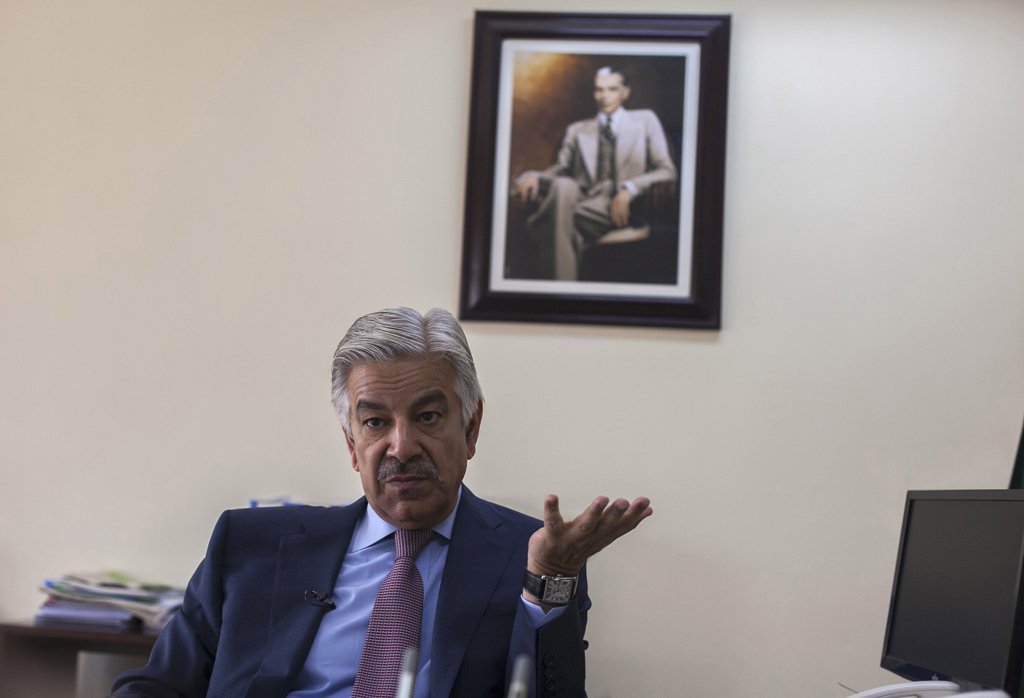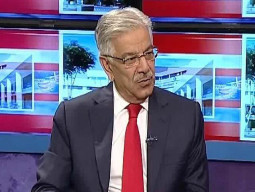
Winding up debate on a recent visit to South Asia by Secretary of State Rex Tillerson, the minister told the house that Pakistan had conveyed to the US official in unequivocal terms that it would not accept India’s role of a regional policeman.
It was Asif’s second appearance before the Senate during the past one week to give briefing on the government stance in the wake of a new US policy for South Asia, particularly after a threatening speech of President Donald Trump in August this year.
Responding to apprehensions raised by several senators, Asif reiterated the claim he made in his last week’s policy statement that the Pakistani side had asked Tillerson to get input from the State Department and other civilian institutions while framing a new policy of Afghanistan instead of wholly relying on military generals who failed on the ground during the last 16 years in the war-torn country.
Taliban increases influence, territory in Afghanistan: US watchdog
Responding to opposition members’ suggestion that the same principle should be applied by Pakistan while formulating the foreign policy, the minister claimed this was already being done in the country.
“I fully agree to this suggestion. We are striving for this,” he said, adding that the government was actively utilising the platform of the National Security Committee in evolving the foreign policy.
“No single institution is framing the policy as the NSC has representation of all stakeholders, including top civil and military leadership,” he said. “While framing our new policy, we would be utilising guidelines given by parliament as well,” he assured the house.
The foreign minister said Pakistan was engaged in talks for peace in Afghanistan as it believed there was no military solution to the war in neighbouring country.
US has failed in Afghanistan: FM Asif tells NA committee
During Tillerson’s visit, Asif said, it had been conveyed to the US that Pakistan was ready to take action against any militant group if the US could provide actionable intelligence.
He said Tillerson had conveyed the same message to the US Senate. “After his visit to South Asia, Tillerson has told the US Senate that Pakistan has asked for actionable intelligence,” he added.
Unlike the previous regimes, Asif said, this government would not show “timid attitude” while dealing with the US. “Rather, it will formulate its policy keeping the country’s interest at the top,” he added.
Missing women and children
The Pakhtunkhwa Milli Awami Party (PkMAP), a government ally, joined the opposition in staging a token walkout on the issue of three women and their children, belonging to the Awaran district of Balochistan, who had gone missing.
Speaking on a calling-attention notice, Dr Jegabzeb Jamadini of the Balochistan National Party-Mengal (BNP-M) claimed that the missing women included wife of Dr Allah Nazar, a Baloch separatist leader.
“How can Pakistan criticise India for human rights violations in Kashmir if women and children were picked up from different parts of the country and go missing in mysterious circumstances,” Dr Jamaldini told the house.
Dr Jamaldini was supported by Farhatullah Babar of the Pakistan Peoples Party (PPP). He said the Pakistan delegation to the UN review conference in Geneva next week would have a hard time explaining the mysterious disappearances of its citizens at the hands of mysterious elements with alarming impunity.
“Activists dissenting with state narrative faced three threats – they disappear mysteriously or are charged under the Pakistan Electronic Crimes Act for endangering integrity of the federation or beaten black and blue in broad-day light by invisible people,” Babar said.
The latest disappearance of the family of a Baloch dissident, prosecution under PECA of a journalist in Quetta for posting comments viewed as critical of a security agency and the beating of a Islamabad-based journalist by “invisible people” in Islamabad demonstrated this dangerous trend in stifling the voice of dissent, he added.
He said that after 2012, when Pakistan's human rights record was last reviewed, the situation had further deteriorated.
In September last year, a meeting of the Senate human rights committee in Karachi made some recommendations about addressing the issue of missing persons, he said. When the committee revisited the city last month, it was shocked to find that many more people had disappeared – a clear rebuff to the senate committee, he added.
“Till today not a single person has been charged or investigated for involvement in the crime. The unanimous recommendations of the Senate over a year ago remain unimplemented. This is the curtain-raiser of news reports on the eve of the UN review of our human rights record but the state is oblivious of it or just does not care,” he said.
Minister of State for Interior Talal Chaudhry said that according to initial information, the three women and their children were arrested while trying to cross border illegally.
Senate Chairman Raza Rabbani read out articles 4, 9, 10, 10 A and 14 of the Constitution guaranteeing the fundamental human rights to every citizen and questioned how the government could bypass them. He asked the minister to take all the details on these women and children and inform the House on Thursday (today).












































COMMENTS
Comments are moderated and generally will be posted if they are on-topic and not abusive.
For more information, please see our Comments FAQ